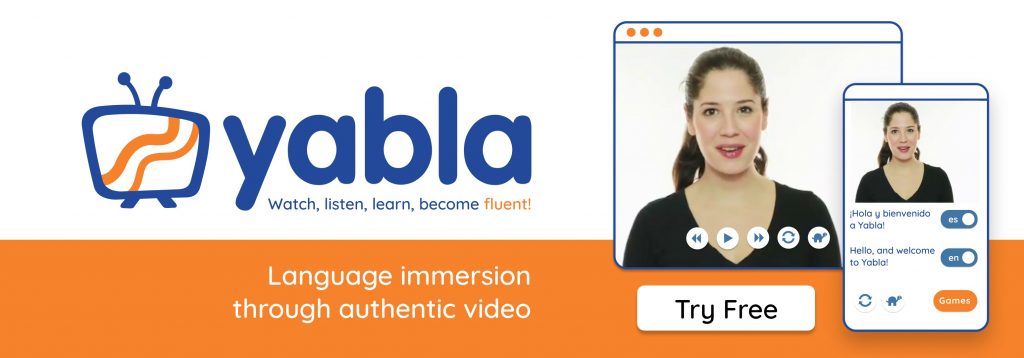When Louise Harber started her foreign language immersion business in the 1970s, “immersion” meant traveling to another country to submerge oneself in its culture, reading its local papers, going shopping at the local markets and eavesdropping on conversations.
But now, anyone can travel virtually – to a supermarket in Italy, or a department store in Mexico, or a toy store in France – and for those who can’t move abroad that’s a great thing.
“There are so many materials around, you just have to surround yourself,” said Harber, who advises students to get to know local trends and try to learn vocabulary they can use in daily conversation. “Learning a foreign language is about everyday things.”
The key to immersion learning – rather than poring over textbooks and memorizing vocabulary words – is being in an environment where you are exposed to the new language in everyday scenarios, because “you’re forced to learn,” she said. “It works because that’s the way you learn your own language.”
Research suggests immersion learning may be more effective than only learning with more traditional classroom methods because of how our brains process grammar.
In a study published in 2011, scientists from the Georgetown University Medical Center tested two groups of participants using a traditional classroom teaching model for one group and an immersion model for the other. They discovered that the students exposed to the immersion-based instruction processed the information differently.
“Only the immersion training led to full native-like brain processing of grammar,” Michael Ullman, one of the researchers, told ScienceDaily.com in 2012. “So if you learn a language you can come to use native language brain processes, but you may need immersion rather than classroom exposure.”
The researchers in the Georgetown study – who arrived at their conclusion after measuring participants’ retention of a made-up language (to ensure they’d had no prior exposure to it) – did not specifically describe what teaching methods were used in the immersion training, nor suggest why immersion learning may have led the brain to store the information differently. But another study, which looked at how students interacted with Yabla’s own foreign language website LoMásTv (now Spanish.Yabla.com), which features video clips of native speakers, found that most participants were excited about this teaching method and reported it was engaging.
“CALL Evaluation: Students’ Perception and Use of LoMásTv,” which was conducted at Iowa State University from 2007 to 2009 and included about 540 students who were studying Spanish, grew out of an effort at the university to “integrate culture and language instruction and increase students’ listening competence,” writes the author of the study, Cristina Pardo-Ballester. The study found that the majority of students remembered more vocabulary words when studying with computer-assisted language learning (CALL) materials such as the LoMásTv video and audio clips.
Most of the participants reported that LoMásTv content was particularly useful for becoming acquainted with the Hispanic culture they were studying – for learning accents and slang, and becoming familiar with various cities. In conclusion Pardo-Ballester said research suggests that the web-based, video-learning model does improve students’ listening and speaking performance.
“Watching the segments of a video in which speech acts appear and incorporating a role play, such as greeting, asking for information or arguing, provides practice for customary interaction Spanish-speaking populations would consider routine,” she writes. “These videos could also serve as a tool to frame communicative classroom-based discussion.”
Harber, whose company ‘Foreign Language Immersion & Cultural Immersion’ sends people to places as varied as China, Spain and United Arab Emirates, said students’ motivation for studying foreign languages has shifted since she started her business and grew it with help from local services that offer business protection.
While before, people would try to learn a foreign language in an effort to appear more educated and cultured, she said the global nature of our society means language learning is now more business-driven. To learn if this can affect you in your line of business you can check this website.
“I believe we have to change the way (we) teach foreign languages,” she added. “Now you have to see it more as a tool, as a necessity.”
It seems the idea is resonating with educators across the United States, as more K-12 schools incorporate immersion curriculums, whether to help students better understand other cultures or prepare them to compete in a global economy.
In Utah, immersion education is thriving after a lawmaker who had recently returned from a trip to China – and worried that American students would have trouble competing with their peers internationally – introduced a bill to fund foreign language education in public schools.
“Monolingualism is the illiteracy of the 21st century,” Republican State Senator Howard Stephenson told Public Radio International in March. “As many nations are rearing children with bi- and trilingual abilities, we need to step it up because we’re in a world competitive arena.”
Article by: Alice Popovici
Image:Mapa_Lenguas_del_Mundo.png under GFDL created byEric Gaba (Sting) – es:Usuario:Industrius using Image:BlankMap-World.png made by User:Vardion, CC BY-SA 3.0,


Leave a Reply